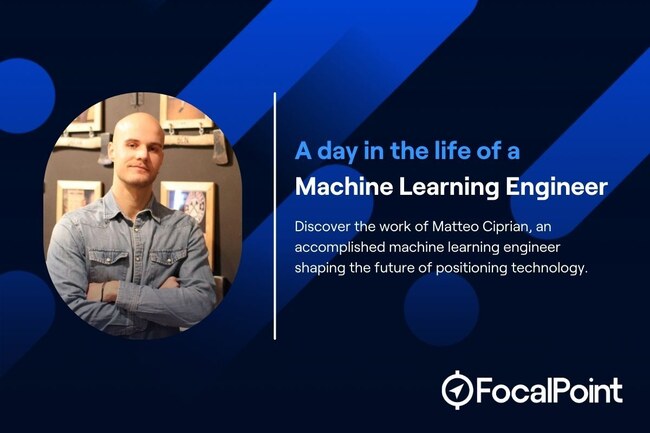Matteo Ciprian: A day in the life of a machine learning engineer at FocalPoint
Ramya Sriram
10 min read
13th Sep, 2024
Employee spotlight

In this blog post, we interview Matteo Ciprian, Machine Learning Engineer at FocalPoint. Matteo is an accomplished machine learning engineer, whose work is helping to shape the future of positioning technology. In this conversation, he takes us through his journey, outlines his favourite tools and talks about the impact of philosophy on his career and life. Read on for a fascinating glimpse into the life and mind of a machine learning engineer.
1. Tell me about your background and how you use your skills in your day to day work.
I hold a Master’s degree in Telecommunications Engineering from the University of Padua (Italy), specializing in signal processing. For those unfamiliar with this field, it involves extensive mathematical analysis.
Signal processing is all about analyzing data, often in the form of sequences over time (like sound waves or sensor data), to get useful insights from it.
When I started my master’s studies in 2016, machine learning and deep learning were becoming very popular. These technologies started to play a big role in signal processing, allowing us to create smarter tools (called adaptive filters) that can adapt based on the different types of data received. This allows them to be customized for specific tasks, which is a significant improvement over the static filters used previously.
In my current job at FocalPoint, I use my maths skills every day to design these filters on different types of signals. This could be anything from raw GPS signals from a receiver to data from accelerometers. In GPS signal processing, adaptive filters are used to reduce noise, interference, and multipath effects caused by obstacles like buildings or trees. They continuously adjust to improve the accuracy of positioning by filtering out distortions and enhancing the quality of the received signal, especially in challenging environments.
2. What is your specific role within the ML team at FocalPoint? What’s the real-world impact of your work?
I am an R&D engineer so I produce machine learning models, design neural networks and ensure they smoothly run to production. My role involves working closely with data engineers to make sure these models are integrated and operational in our live applications.
My focus is on improving GPS accuracy in mobile devices and wearables, making pedestrian navigation safer and more reliable. We use machine learning, signal processing, and sensor fusion techniques to analyze and combine data from different sources for accurate location tracking.
For instance, if you’re running through a park with trees overhead that weaken GPS signals, or navigating in a city with tall buildings that reflect signals, our technology ensures you can still find your way efficiently. You’ve probably noticed the blue dot on your smartphone map misbehave in these scenarios. Our technology corrects these issues, providing more accurate navigation even in challenging environments.
3. How did you develop an interest in machine learning?
My interest in machine learning grew out of my passion for sensor technology. ML helps unlock deep insights from sensor data, enabling smarter and intelligent systems. This powerful combination of sensors and ML is what really drew me into the field. I also believe in “Tech for Good”: I hope to use my skills to improve the lives of others. I have worked for two health tech companies previously. At FocalPoint, I’m fortunate enough to be working on solving navigation problems that promise to have a global impact.
4. Did you always know you wanted a career in engineering? What inspired you to get into this field?
While at school, I was interested in philosophy. At university, I had to choose between studying physics and philosophy. I decided to go with engineering as I think it combines aspects of both subjects. I like the theoretical exploration that philosophy offers, but I also like to put ideas into practice. I believe that science helps me find the right answers to problems, and philosophy helps me understand which problems are worth being addressed.
5. Do you think there are some parallels between philosophy and engineering?
Yes, for sure. I believe there should be much more engineering integrated into philosophy and vice versa. I try to pursue both because I don’t think these disciplines should be considered completely separate. Both solve problems in a way that’s not provided by previous beliefs of existing rationale. Both challenge the status quo and push you to think in new ways. And that’s what excites me. With sensor technology and machine learning, we constantly rethink how we can solve problems.
6. Who are some of your favourite philosophers?
I like Karl Popper and Edmund Husserl as they both tried to combine philosophical thinking and science. They didn’t see science and philosophy as two different compartments: they tried to discover analogies between the two streams, analyzed the limits of each, and studied the nature of the relationship between them.
[To learn more about Matteo’s work, read his article on how machine learning is being applied to improve pedestrian navigation.]
7. You have your own YouTube channel where you speak about innovation in machine learning and signal processing. What inspired you to start this and what keeps you going?
I love that ML is not a specific field but a way of solving problems. And there are thousands of ways to solve a problem. It’s impossible even for a machine learning engineer to understand the breadth and variety of ML applications. Typically, your knowledge is restricted to your field, so you know how to apply a specific neural network to solve a specific problem. But there’s a whole world out there. I find this exciting because that means there’s a lot to explore and discover within ML.
By starting a YouTube channel (check it out here), I wanted to provide an opportunity for others to share their knowledge of machine learning for the benefit of the wider ML community – and I also get to learn along the way!
9. The machine learning field is rapidly evolving. What emerging technologies are you most excited about?
I’m really excited about the potential of large language models (LLMs). While they’re still in the early phases of development, they already offer a wide range of applications within the machine learning field.
Closer to the field we work in, Physics-Informed Neural Networks (PINNs) stand out as particularly interesting. PINNs are neural networks that integrate physical laws, like equations, directly into their training. For example, when modeling how heat flows through a metal rod, a PINN uses both temperature data and the heat equation (a physical law) to ensure that its predictions align with real-world behaviour. This allows PINNs to solve complex physical problems more efficiently, even with limited data. This approach can potentially be applied to challenges in positioning and navigation as PINNs are able to leverage both physics and data to make predictions.
10. What advice would you recommend for young people starting their career in machine learning, GNSS engineering, or related fields? What are the essential skills needed?
I’d recommend that you stay curious and start trying to identify the field that interests you. The applications are diverse and there are plenty of online resources that can help you explore and narrow down the field you want to work in. Think of it this way: ML is a set of tools. You can choose whether to be involved in studying the tool itself (which would mean you take up ML research) or you can choose where you want to apply the toolkit. So find a specific field that interests you – finance, wearables, medtech, etc.
A huge amount of material is available for free. I would say YouTube is a great place to start – most of the reputed universities run an ML course, including Stanford. More specific courses are on Udemy and Coursera. And of course, don’t forget to check out my YouTube channel. 🙂
There are also several tools that you can use for ML but personally, I love Python because it’s very quick and it’s easy to rapidly develop and test ideas.
11. What do you enjoy most about working at FPP?
I really like the innovative and challenging environment. We’re solving big problems but the work culture is very relaxed and familiar. We work with big companies and hi-tech innovation but we retain that small-company culture. There’s no complex hierarchy and I like the horizontal structure.
The work from abroad policy is really good as it gives people the option to choose their work location. We have the flexibility to work from home, work from the office or do a blend of both. While I typically work from the office in Cambridge, I’ve been able to work from Italy, giving me the opportunity to spend more time with family.
I think the flexibility that FocalPoint offers is great. It’s simply the right thing to do.
——
Interested in learning more about Matteo’s work? Read his article on the crucial role of GPS in wearable tech.







